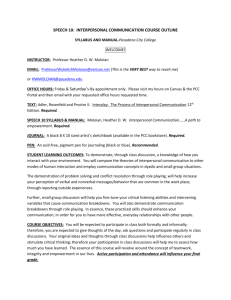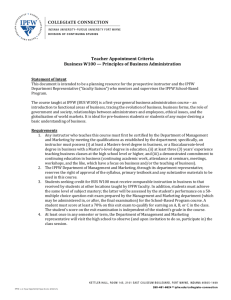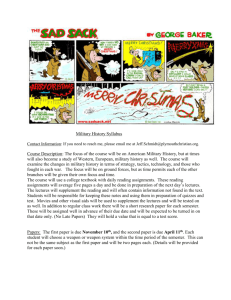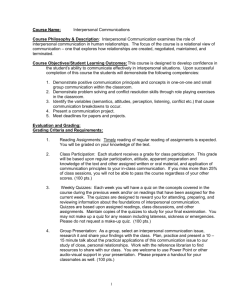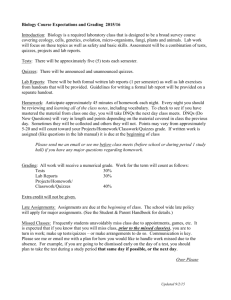Syllabus - IPFW.edu
advertisement
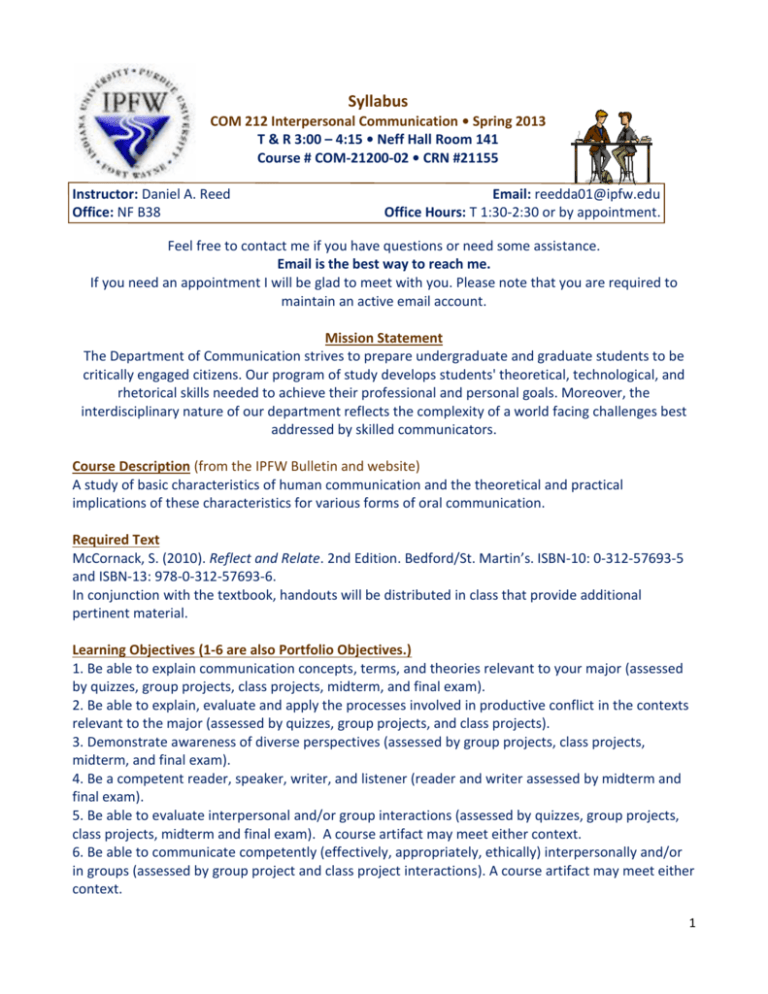
Syllabus COM 212 Interpersonal Communication • Spring 2013 T & R 3:00 – 4:15 • Neff Hall Room 141 Course # COM-21200-02 • CRN #21155 Instructor: Daniel A. Reed Office: NF B38 Email: reedda01@ipfw.edu Office Hours: T 1:30-2:30 or by appointment. Feel free to contact me if you have questions or need some assistance. Email is the best way to reach me. If you need an appointment I will be glad to meet with you. Please note that you are required to maintain an active email account. Mission Statement The Department of Communication strives to prepare undergraduate and graduate students to be critically engaged citizens. Our program of study develops students' theoretical, technological, and rhetorical skills needed to achieve their professional and personal goals. Moreover, the interdisciplinary nature of our department reflects the complexity of a world facing challenges best addressed by skilled communicators. Course Description (from the IPFW Bulletin and website) A study of basic characteristics of human communication and the theoretical and practical implications of these characteristics for various forms of oral communication. Required Text McCornack, S. (2010). Reflect and Relate. 2nd Edition. Bedford/St. Martin’s. ISBN-10: 0-312-57693-5 and ISBN-13: 978-0-312-57693-6. In conjunction with the textbook, handouts will be distributed in class that provide additional pertinent material. Learning Objectives (1-6 are also Portfolio Objectives.) 1. Be able to explain communication concepts, terms, and theories relevant to your major (assessed by quizzes, group projects, class projects, midterm, and final exam). 2. Be able to explain, evaluate and apply the processes involved in productive conflict in the contexts relevant to the major (assessed by quizzes, group projects, and class projects). 3. Demonstrate awareness of diverse perspectives (assessed by group projects, class projects, midterm, and final exam). 4. Be a competent reader, speaker, writer, and listener (reader and writer assessed by midterm and final exam). 5. Be able to evaluate interpersonal and/or group interactions (assessed by quizzes, group projects, class projects, midterm and final exam). A course artifact may meet either context. 6. Be able to communicate competently (effectively, appropriately, ethically) interpersonally and/or in groups (assessed by group project and class project interactions). A course artifact may meet either context. 1 7. Be able to explain how you can apply what you have learned to your own life (assessed by quizzes and final exam). Portfolio Requirement for Communication Majors If you major in either or both of Interpersonal and Organizational Communication or Media and Public Communication via the 2009-2010 bulletin or a later bulletin, you will be required to create a portfolio as part of the new sequence of required one-credit classes: COM 120, COM 308, and COM 480. In this course you will create products that can be used as evidence for some of the student learning objectives for that portfolio. If you were not in class the day these items were returned and you need these items make sure to request them before the end of the semester to insure they will be available. Teaching Philosophy My job is to facilitate your learning. I will do my best to structure the course in a way that provides you with opportunities to learn, assess, evaluate, and apply the concepts to your life. I am here to assist you. If you have questions or concerns about the class, the assignments, or the content, do not hesitate to contact me for a consultation. This class introduces and practices Choice Theory which says that the only person’s behavior you can effectively control is your own. An engaged class is where students learn best. My goal is to create a comfortable environment and curriculum that allows you to be engaged. Questions and observations are encouraged and welcome. Because some people think and learn primarily visually (by seeing), auditorially (by hearing), or tactually and kinesthetically (by doing and feeling), class material will be supplemented with visuals such as Power Points, videos, illustrations, audio materials, and interactive classroom projects whenever possible to enhance your learning experience. You will be given an assessment at the beginning of class to determine your own primary and secondary learning styles. Student Responsibilities Although I am here to create a solid learning environment for you, you are responsible for your own learning. This means that you are willing to make this class a priority, seek assistance when needed, and be proactive and resourceful in the learning process. Being responsible for your own learning means that you: Read and consider the material. Attend class. Take the quizzes. Participate in the class discussions. Complete assignments thoroughly and on time. Class Policies Missed Classes: If you cannot or do not attend class, get the notes from someone. Participation points can only be obtained by being here and active. If you know you must miss class, talk to me and your group ahead of time. In case of emergency, let me know ASAP. 2 Cell Phones: In order to give your fellow students the respect they deserve and make the most of the class time allotted, you are requested to put your cell phones in “silent mode” while in class. Civility Expectations: While it is not required or even advisable that you always agree with someone else’s opinions, you are asked to respect them. The IPFW Statement on Civility reads as follows. “Prominent among the values that define the academic community is civility, which includes mutual respect, fairness, and politeness. Respect and civility should therefore be afforded to all individuals regardless of race, ethnicity, gender, age, sexual orientation, disability, religion, family status, socioeconomic level, educational background, veteran status, or position at the University.” Late Work: While I do accept late work, each day (including weekends) late is subject to up to 20% reduction in points (which means after five days, you have pretty much earned a 0). If you are having a technical problem, have questions about the assignment, or are having other issues which make it difficult for you to complete the assignment on time, always let me know before the assignment is due. In general, make-up work must be completed no more than two weeks after the assignment and two weeks prior to the last day of class to receive credit. Plagiarism: Plagiarism is a serious issue but it is easily avoided by making sure you properly document your sources. If you are not sure how to do this, don’t hesitate to ask. The IPFW Undergraduate & Graduate Bulletin defines plagiarism as a form of cheating in which the work of someone else is offered as one’s own. The language or ideas thus taken from another may range from isolated formula, sentences, or paragraphs, to entire articles copied from printed sources, speeches, software, or the work of other students. Plagiarism is cheating and is considered a form of academic dishonesty. According to IPFW policy, academic honesty is expected of all students. You are responsible for knowing how to maintain academic honesty and for abstaining from cheating, the appearance of cheating, and permitting or assisting in another’s cheating, and has the following potential consequences. (1) The student may be given a lower grade than the student would otherwise have received or a failing grade for any assignment, course work, examination, or paper involved in the act of misconduct. (2) The student may be required to repeat the assignment, complete some additional assignment, or resubmit any assignment, course work, examination, or paper involved in the act of misconduct. (3) The student may be given a lower grade than the student would otherwise have received or a failing grade for the course. Helpful Places on Campus Center for Academic Support and Advancement (CASA). Offers many kinds of services to students including free tutoring and support in developing reading, writing, math, and study skills. KT G23/ 481-6817. www.ipfw.edu/casa. Child Care. The Learning Community (TLC) offers off-campus child care. 2041 Reed Road/424-8852. www.tickidsfirst.com. Information Technology Services. IT support for faculty, staff, and students. Kettler Hall, 2nd Floor, West Wing/481-6030. www.its.ipfw.edu. 3 Information Technology Services Help Desk. IPFW network support for password resets, troubleshooting, student housing support, Blackboard assistance and more. KT206/481-6030. www.its.ipfw.edu/support. Library, Walter E. Helmke. Offers comfortable study spaces, computer work stations, research consultations with subject librarians, IUCAT catalog access to Indiana University Libraries (over 9+ million books), and more. Soon to be connected to the new Student Services Complex. Helmke Library/481-6505. library.ipfw.edu. Services for Students with Disabilities. Provides appropriate academic aids and services and support to ensure equal access for students with disabilities. WSU/113/481-6657. www.ipfw.edu/ssd. Writing Center. Can help you with general writing problems or specific assignments (including APA research papers). Provides free one-on-one, group, and online writing consulting and use of computers. Assists experienced and beginning writers to improve their papers in any class. KTG19/481-5740. www.ipfw.edu/casa/writing. See your school bulletin or visit the IPFW website for additional assistance available to you. IPFW is a University that not only provides knowledge to you. It also provides ways to assist you in obtaining that knowledge, so take advantage of your advantages by seeking assistance whenever you feel you need it. How You are Graded. Total Points Available = 1,000. 1. Participation & Attendance. 200 Points. (20% of your grade.) Your ongoing participation in projects and discussions are part of your grade. Projects and discussions will take a variety of formats including, but not limited to, analysis of a topic after being divided into groups, team or group competitions, role-playing scenarios, etc. An evaluation of your class participation is done with skill assessments. Do you use concrete language to name or describe the problem? Do your non-verbal expressions invite connection with others? Do you stay focused on the issue? Do you exhibit effective listening skills such as paraphrasing and asking questions to clarify ? Do you express your opinions, feelings, and needs without being critical, demanding, or blaming (do you use “I” statements as opposed to “you” statements)? Participation requires attendance and attendance is taken each class period. Some of the exercises that are done in class have points assigned to them and these points can only be earned by being in class on that particular day. If you miss class consistently, you are subject to losing six points for each day missed. 2. Quizzes. 250 Points. (25% of your grade.) (125 questions/2 points each) Quizzes: There are quizzes covering chapters 1 (30 pts.), 4 (30 pts.), 5 (30 pts.), 6 (40 pts.), 7 (30 pts.), 8 (30 pts.), 9 (20 pts.), 11 (20 pts.), and 12 (20 pts.) which will cover the key concepts of both the textbook material and the supplemental handouts (see key concepts listing below). The quizzes will assess your knowledge using multiple-choice, matching and true/false questions. 3. Midterm Exam. 200 Points. (20% of your grade.) The midterm exam is a written assignment. 4 Written theme assignments are graded based on the following criteria. 1. Does your writing and its presentation represent college-level work? 2. Does the work reflect meaningful and/or significant thought? 3. Is your use of course concepts accurate and correctly applied? A review will be given in class before any written assignment. Assignment expectations will be established in writing and distributed to you which will explain the exact content and questions you should address, classify the tone and style of writing (formal, informal), describe whether outside resources are required (how many, what type, and what style of documentation), and explain formatting requirements. For your written assignments and your class participation you want to give more than just your opinion. It is important for you to have an opinion. However, just because you have an opinion, does not mean it is an opinion based on evidence and sound reasoning. Part of the college educational process is learning to back up your statements with facts, direct experiences, concepts from the text, valid sources, scientific research, etc. In other words, substantiate what you say in order to make a convincing argument. 4. Final Exam. 200 Points. (20% of your grade.) The final exam will be either a written theme assignment, an oral assignment, an exam, or a combination of any of these. 5. Other Assignments and Exercises. 150 Points. (15% of your grade.) Each of the following five class/group assignments are worth 30 points each: 1. Social Penetration Theory & Individualist Culture Exercise (Chapter 2). 2. Experiencing and Expressing Emotions Exercise (Chapter 4 – Class Determines the Exercise.) 3. Communication Observation Exercise (Chapter 6). 4. Handling Conflict Exercise (Chapter 9). 5. Effective Boss Exercise (Chapter 12). 6. Extra credit points can be earned at various times throughout the semester. Extra credit points are generally earned by having knowledge of textbook material or by assisting in classroom exercises. Grading Scale 97-100% = A+ 93-96%=A 90-92% = A- 87-89% = B+ 83-86% = B 80-82% = B- 77-79% = C+ 73-76% = C 70-72% = C- 67-69% = D+ 63-66% = D 60-62% = D- 0-59% = F (“In-between” grades will be rounded up or down using .5 as the midpoint. For example, 79.5 will be rounded up to 80. 79.4 will be rounded down to 79.) 5 Course Schedule (This semester covers 17 weeks, 31 total class days.) Introduction Chapter 1 Week 1 T 1/15 Course Orientation/Introductions/Syllabus Review. R 1/17 Learning Styles Assessments/Class Preface. Assignments: 1. Preview your textbook and determine what interests you most. 2. William Glasser’s Five Basic Needs & Assessing Your Needs Exercise Handouts. Week 2 T 1/22 R 1/24 Part One Week 3 T 1/29 R 1/31 Week 4 T 2/5 R 2/7 Week 5 T 2/12 R 2/14 Part Two Week 6 T 2/19 R 2/21 Basic Needs Review and Assessment Exercise & Text Preview Exercise. Group Assignments. Assignment: Read Chapter 1. Quiz on Chapter 1: Introducing Interpersonal Communication. (30 points) Chapter 1 Group Exercise. Retreat Day Prep. Chapters 2, 3 and 4. Class Retreat. Handout: Social Penetration Theory. Assignment: Read Chapter 2. Chapter 2: Considering Self. Social Penetration Theory & Individualist Culture Exercise (30 points). Assignment: Read Chapter 3. Chapter 3: Perceiving Others. Movie Day 1: Temple Grandin. Movie Day 2: Watch Remainder of Temple Grandin. Chapter 3 and Movie Review. Cambridge Behaviour Scale Empathy Quotient Exercise. Assignment: Read Chapter 4. Quiz on Chapter 4: Experiencing and Expressing Emotions. (30 points) ARFPTRP’s (Almost Ready for Prime Time Relationship Players): Blended Emotions Skit Emotions/Feelings/Moods Review & Discussion. Handout: Identifying Feelings. Anger Review & Discussion. ARFPTRP’s: Anger/Revenge Skit. Self- Assessment of Anger Questionnaire & Anger FAQ’s. Experiencing and Expressing Emotions Exercise. (30 points) Handout: Anger 5 x 8 Card Assignment: Read Chapter 5. Chapters 5, 6, 7, 8, and 9. Quiz on Chapter 5: Listening Actively. (30 points) Listening Style Exercises. Chapter 5 Review & Class Exercise. Handouts: Honesty & Messages/Metamessages. Assignments: Read Chapter 6. 6 Week 7 T 2/26 R 2/28 Week 8 T 3/5 Quiz on Chapter 6: Communicating Verbally. (40 points) Chapter 6 Review and Exercise. Communication Observation Exercise Assignment. Communication Observation Exercise. (30 points) Assignment: Read Chapter 7: Communicating Nonverbally. Quiz on Chapter 7: Communicating Nonverbally. (30 points) Chapter 7 and Lie to Me Preview. TV Series Day 1: Watch First Lie to Me Episode. R 3/7 TV Series Day 2: Watch Second Lie to Me Episode. Midterm Exam Assignment & Midterm Evaluation Sheet Handout. Week 9 T 3/12 R 3/14 No Class. Spring Break. No Class. Spring Break. Week 10 T 3/19 R 3/21 Week 11 T 3/26 R 3/28 Week 12 T 4/2 R 4/4 Part Three Week 13 T 4/9 R 4/11 Week 14 T 4/16 Chapter 7 Review. Reading People Myths & Truths Introducing NLP (Neuro Linguistic Programming) Proxemics Discussion. Chapter 7 Review Continued. Reading People: Handwriting Analysis Exercise. Demonstrating NVC Class Exercise. Assignment: Read Chapter 8. Midterm Exam Due at Beginning of Class. (200 points) Quiz on Chapter 8: Developing Interpersonal Competence. (30 points) Chapter 8 Exercise. Assignment: Read Chapter 9. Quiz on Chapter 9: Managing Conflict and Power. (20 points) Chapter 9 Exercise: Exploring Conflict and Power and How it Effects Interpersonal Communication and Relationships. Controlling Parents Questionnaire: Dr. Dan Neuharth. Handling Conflict Group Exercise. (30 points) Chapters 1 through 9 Review: “I Know That Answer!” Game Show. (Extra credit points) Handout: 4 Horsemen of the Apocalypse. Assignment: Read Chapter 10. Chapters 10, 11 and 12. Handout: Final Exam Study Guide. Chapter 10: Relationships with Romantic Partners. Exercises: Must-Haves & Can't Stands/Bids for Connection/How Well Do You Know Your Partner. Chapter 10 Continued. Chapter 10 Continued. Various Handouts Will be Provided for Chapter 10. 7 R 4/18 Assignment: Read Chapter 11 Quiz on Chapter 11: Relationships with Family and Friends. (20 points) Chapter 11 Class Exercise. Assignment: Read Chapter 12. Week 15 T 4/23 Flex Day. R 4/25 Quiz on Chapter 12: Relationships in the Workplace. (20 points) Effective Boss Exercise. (30 points) Week 16 T 4/30 R 5/2 Class Discussion/Course Summarization/Class Evaluations/Workplace Info. Final Exam Review. Week 17 T 5/7 R 5/9 Final Exam Week No Class. Final Exam Week. Final Exam is from 10:30 a.m. - 12:30 p.m. (200 points) Key Concepts There will be quizzes covering the key concepts listed below for Chapters 1, 4, 5, 6, 7, 8, 9, 11, and 12. Quizzes will also cover handouts distributed in class. Chapter 1: Introducing Interpersonal Communication. Five features that characterize communication, the three models that describe the communication process, the definition of interpersonal communication, the relationship between interpersonal communication and ethics, the definition of ethics, the difference between qualitative and quantitative research, the definition of culture, the definition of gender, the source of gender (Is it biological or learned?) the impact of online communication on our ability to interpersonally communicate, and the definition of interpersonal relationships. From the handout on Dr. William Glasser’s five basic needs: What needs do the best relationships share? Chapter 2: Considering Self. Self-concept, self-esteem, how media shapes self-esteem, difference between sex and gender, attachment styles, Individualist and Collectivist cultures, self-presentation online, Social Penetration Theory, and self-disclosure. Handouts: Who Am I? Questionnaire, Dr’s. Irwin Altman and Dalmas Taylor’s Social Penetration Theory. Chapter 3: Perceiving Others. Three steps in the perception process, Uncertainty Reduction Theory, influences on perception, definition of personality, Gestalts/Halos/Horns, stereotypes, and empathy. Chapter 4: Experiencing and Expressing Emotions. Definition of an emotion, difference between emotions, feelings, and moods (Figure 4.1), the most effective strategy for improving bad moods, six primary emotions (surprise, joy, disgust, anger, fear, and sadness), blended emotions, anger, catharsis, passion, grief, and the best way to help others manage their grief. Handouts: Dr. John Gottman’s Identifying Feelings Exercise, Anger (2 Handouts). 8 Chapter 5: Listening Actively. Mr. Rogers, the five-steps in the process of listening, feedback, paraphrasing, the five functions of listening, selective listening, pseudo-listening, aggressive listening, and narcissistic listening. Chapter 6: Communicating Verbally. The definition of verbal communication, symbols, what dialects may include, the difference between high-context and low-context cultures, the six functions of verbal communication (sharing meaning, shaping thought, naming, performing actions, crafting conversations, managing relationships), denotative vs. connotative meaning, the most common type of language activity (conversation), three characteristics of cooperative verbal communication, the single most important characteristic of cooperative verbal communication, the difference between “I” language and “You” language, what J.M. Honeycutt’s research showed about couples who use “We” language, communication accommodation theory, and the most common form of deception. From the Honesty handout: Dishonesty (not telling the truth) is a character disorder. From the Messages/Metamessages handout: What messages and metamessages are. Chapter 7: Communicating Nonverbally. Definition of NVC, the percentage of the meaning exchanged during interpersonal encounters that comes from nonverbal sources, The four patterns of gender differences found by scholars Hall, Carter & Horgan, the definitions (descriptions) of the eight different nonverbal communication codes that scholars have distinguished, the significance of touch (haptics) in infant development, and the difference between M-time and P-time. Chapter 8: Developing Interpersonal Competence. The definition of interpersonal communication competence, communication skills, appropriateness, high self-monitors vs. low self-monitors, effectiveness, ethics, conventional messages vs. rhetorical messages, flaming, intercultural competence, ethnocentrism, communication apprehension, and control messages. Chapter 9: Managing Conflict and Power. The definition your textbook gives for conflict, conflict unfolds over time and is determined by the communication choices we make, where most violent conflicts occur, the two components of the Chinese character for conflict, four ways of managing conflict, the most constructive approach for managing conflict, and the most destructive response to conflict. Chapter 10: Relationships with Romantic Partners. Liking and loving, passionate love vs. companionate love, Sociologist John Alan Lee’s six primary types of love, Dr. Leslie Baxter’s Relational Dialectics, four reasons that you are drawn to someone creating a romantic attraction (proximity, physical attractiveness, similarity, and resources), social exchange theory, equity, six relational maintenance strategies (positivity, openness, assurances, sharing activities, sharing tasks, and social networks), dysfunctional relationship beliefs, and five common signs of an abusive partner. Handouts: Recipe for Marital Happiness, 50 Most Popular Must-Haves & Can’t-Stands, 7 Habits/5:1 Ratio Card, Bids For Connection. Chapter 11: Relationships with Family and Friends. Six types of families, family communication patterns, conversation orientation, conformity orientation, the four family communication patterns (consensual, pluralistic, protective, and laissez-faire), maintenance strategies for families, balancing autonomy and connection, communal and agentic friendships, FWB relationships, and three maintenance strategies (sharing activities, communicating openly, and friendship rules). 9 Chapter 12: Relationships in the Workplace. Definition of a workplace relationship, organizational culture, organizational climate and the two types, the six dimensions of how people communicate in organizations, creating a supportive climate, workplace romances, upward communication, downward communication, and the two challenges of downward communication (compliments and criticism). Boredom is the opposite of fun. Boredom always occurs when you aren’t learning. Updated 1/6/13 10 11
